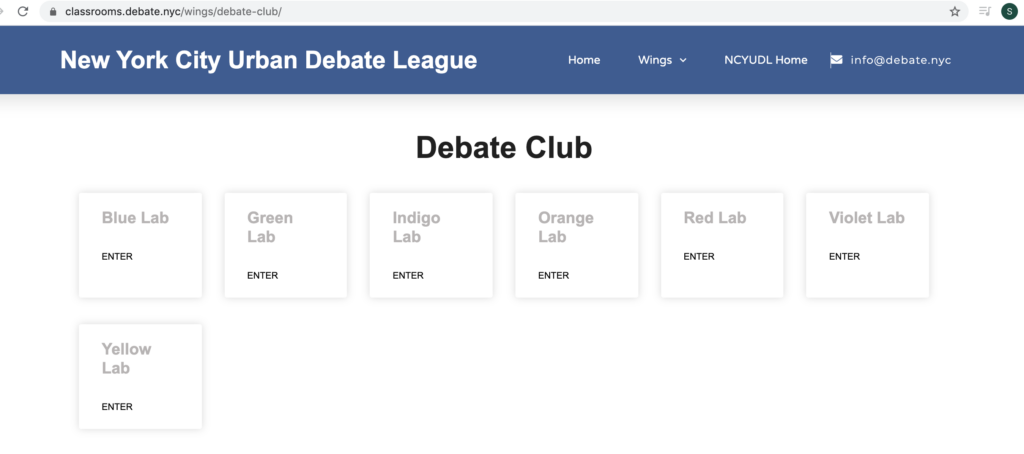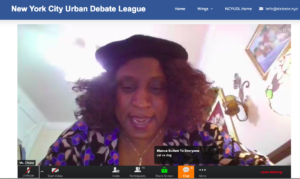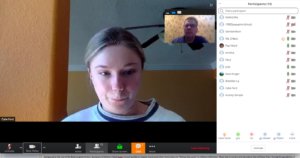 Today, March 21, the New York City Urban Debate League (NYCUDL) completed its first online Saturday Debate Club session for more than 40 students from the greater New York City area. The program is an extension of what was the NYCUDL’s physical Debate Club programming held in downtown Manhattan.
Today, March 21, the New York City Urban Debate League (NYCUDL) completed its first online Saturday Debate Club session for more than 40 students from the greater New York City area. The program is an extension of what was the NYCUDL’s physical Debate Club programming held in downtown Manhattan.
The regular Debate Club session ran from 9:30-11:30 on Saturdays and today’s session ran from 9:30-11:30 on Saturday.
The program used free e-buildings course infrastructure provided by classrooms.cloud to the NYCUDL so the nonprofit could have its own classrooms infrastructure. .  Seven different labs/classes were held to support students in public forum debate and parliamentary debate.
Seven different labs/classes were held to support students in public forum debate and parliamentary debate.
After the two hours session, the instructors met and provided some different points of feedback.
Ease of platform use. Two of the instructors noted how easy it was to use the platform, noting that they were surprised as to how few difficulties were presented with the students accessing it.
Switching rooms. Due to the COVID outbreak, it had been two weeks since we had Debate Club and a few students forgot their lab color. With the set-up, students were able to easily switch labs.
Student problems at the beginning. Two of the instructors noted that one student in each of their groups had basic tech problems — problems with a working microphone, problems hearing, problems knowing how to use the room controls. They all noted, however, that within 10 minutes the students were engaged in learning.
Internet connections. Basic home internet connections worked for almost everyone, but one instructor reported that one student had a weak connection and one instructor reported that her own connection was weak, as she was in a place she is not normally in.
The students paid attention. All of the instructors noted how much the students were engaged and learning.
Setting expectations. One instructor noted that he started the class by setting expectations for the students regarding how the platform would be utilized and the process for asking and answering questions. These included
- No side/non class specific conversations in the chat
- Keeping mics off until call upon to speak
- Turning mics of after one speaks
- Using the electronic, “raise hand” feature before asking a question and waiting to be called on to speak
Relative attendance. The attendance relative to the regular debate club was approximately 63%, with more high school students than MS students being absent.

Attendance. Instructors took attendance for accountability purposes.
A greater emphasis on lecture at the beginning. One instructor noted that the students were reluctant to talk much at the beginning of the class but talked more as the class went on. He said he did start the class more lecture-style at the beginning but then moved in to more interactive work.
All instructors emphasized the desire to make their classes more interactive.
Class size. Instructors with 8 or fewer students found the classes easier to manage in an online environment. This is consistent with experience elsewhere.
April Public Forum topic. The students prepared using the April Public Forum topic on reducing US military presence in the Persian Gulf. The instructors noted the students were eager to engage the topic.
Knowledge of Zoom features. The instructors all noted that most of the students had been in some type of online class previously and were familiar with the basic Zoom features. They also said every student improved their knowledge of using Zoom as the class proceeded, which is perhaps a new “portable skill,” as education shifts to an online world.
Drawing in the room. One instructor noted that a student took her knowledge of the Zoom tools too far and started drawing in the room but that she stopped once she was provided with appropriate instruction.
Zoom room usage. One issues schools are having is that students continue to hang out in the e-classrooms after school is over and engage in behavior that is sometimes not the most appropriate, so we reset the passwords on the rooms after we finished class.
Breakout rooms. At least one of our instructors asked for the ability to use Zoom “break out” rooms so that students could prep between themselves for debates. We do not feel comfortable providing these unless we can also have adults present in those breakout rooms to monitor behavior.
Host functions. Zoom conference rooms provide the host with the ability to control different actions of the other room participants. Some instructors noted that these were helpful.
All instructors did report a positive experience with the day and were even surprised at how well it went for the first time.



Debate Club instructors meet after class to discuss the session.

